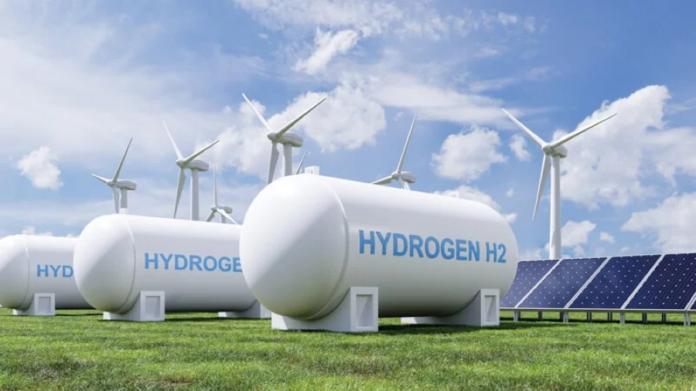A recent study by Rampai, et al. (2024) titled “Hydrogen production, storage, and transportation: recent advances” published in RSC Advances, shows that hydrogen is a clean energy carrier that produces only water as a by-product when used, making it a key player in reducing greenhouse gas emissions and combating climate change.
This article offers an in-depth review of the key aspects of hydrogen production, storage, and transportation, focusing on the critical role hydrogen can play in future energy systems. It explores multiple methods of hydrogen storage, including gaseous, liquid, and solid-state options, analyzing both their benefits and the challenges associated with each. For gaseous hydrogen, the simplicity of storage is balanced against the challenge of needing high-pressure containment systems. Liquid hydrogen, while offering greater energy density, presents issues like cryogenic temperatures and energy losses during liquefaction. Solid-state hydrogen storage, using materials like metal hydrides, offers promising solutions in terms of safety and capacity but faces challenges in terms of cost and efficiency.
“
Hydrogen is a promising clean energy carrier with potential to significantly reduce greenhouse gas emissions and support sustainability.– Rampai, et al. 2024
The article delves into the concept of a hydrogen-based energy system, which is seen as a key enabler of decarbonization across various sectors such as transportation, industry, and power generation. Hydrogen can serve as a clean fuel alternative, producing no carbon emissions when used in fuel cells, thus aiding in the reduction of greenhouse gases and promoting sustainability. The discussion also touches on hydrogen’s potential within a circular economy framework, where its use contributes to creating sustainable energy loops, minimizing waste, and optimizing resource use. Moreover, the article covers different hydrogen production techniques, each with distinct advantages and drawbacks. Electrolysis, for example, which splits water into hydrogen and oxygen using electricity, is seen as a green solution when powered by renewable energy sources. Natural gas reforming, the most common method of hydrogen production today, is more economically viable but releases carbon emissions unless coupled with carbon capture and storage technologies. Biomass conversion is another option that leverages organic materials to produce hydrogen, offering a renewable but complex pathway with its own environmental considerations. Finally, the article examines the role of advanced materials, including metal hydrides, carbon-based materials, and nanomaterials, in improving hydrogen storage. These materials can significantly increase the storage capacity, safety, and efficiency of hydrogen systems. Metal hydrides, for instance, allow for safer and more compact storage, but the development of lightweight and cost-effective hydrides remains a challenge. Carbon-based materials and nanotechnology offer new frontiers for enhancing hydrogen adsorption and release properties, pushing the boundaries of storage capabilities in both gaseous and solid forms.
How the Study was Conducted
The authors employed an extensive review of existing literature to gather information on various hydrogen storage methods, production techniques, and advanced materials. This helped in understanding the current state of technology and identifying gaps in knowledge. Various hydrogen storage techniques were experimentally analyzed. This included testing different storage materials like metal hydrides, carbon-based materials, and nanomaterials to evaluate their storage capacity, kinetics, and safety. The study compared different hydrogen production methods such as electrolysis, natural gas reforming, and biomass conversion. The efficiency, sustainability, and environmental impact of each method were assessed. The use of nanotechnology was explored to enhance the properties of storage materials. This involved fine-tuning material properties at the molecular and atomic levels to improve hydrogen storage capacity and safety. The collected data from experiments and literature reviews were analyzed to draw conclusions about the most effective and sustainable methods for hydrogen production, storage, and transportation.
What the Authors Found
The study posits that hydrogen is recognized as a promising clean energy carrier, producing only water as a by-product, making it highly environmentally friendly. The envisioned hydrogen economy positions hydrogen as a crucial element in decarbonizing sectors such as transportation, industry, and power generation, thereby supporting the transition to a circular economy.
Why is this important?
Environmental Impact: Hydrogen is a clean energy carrier that produces only water as a by-product when used, making it a key player in reducing greenhouse gas emissions and combating climate change.
Energy Security: Hydrogen can be produced from various sources, including renewable energy, which can help diversify the energy supply and reduce dependence on fossil fuels.
Technological Advancements: The exploration of advanced materials and nanotechnology for hydrogen storage can lead to more efficient and safer storage solutions, which are crucial for the widespread adoption of hydrogen as an energy source.
Economic Benefits: Developing a hydrogen economy can create new industries and job opportunities, driving economic growth and innovation.
Decarbonization: Hydrogen has the potential to decarbonize hard-to-abate sectors like heavy industry, transportation, and power generation, supporting global efforts to achieve net-zero emissions.
What the Authors Recommend
- The authors emphasize the need for continued investment in R&D to improve hydrogen production methods, storage technologies, and the development of advanced materials.
- The authors recommend strong policy support from governments to promote the adoption of hydrogen technologies. This includes subsidies, tax incentives, and regulations that encourage the use of hydrogen in various sectors.
- Building a robust infrastructure for hydrogen production, storage, and distribution is crucial. This includes developing hydrogen refueling stations and integrating hydrogen into existing energy systems.
- The study highlights the importance of collaboration between industry, academia, and government to drive innovation and overcome technical and economic challenges.
- Increasing public awareness and understanding of hydrogen technologies is essential for gaining public support and acceptance.
In conclusion, the study by Rampai et al. (2024) underscores the transformative potential of hydrogen as a clean and versatile energy carrier. By highlighting the advancements in hydrogen production, storage, and transportation, the research illustrates how hydrogen can significantly contribute to reducing greenhouse gas emissions and fostering a sustainable energy future. With ongoing research, technological innovations, and supportive policies, hydrogen holds the promise of revolutionizing various sectors, from transportation to power generation, while promoting environmental sustainability and economic growth. The study calls for continued investment and collaboration to address existing challenges and unlock the full potential of hydrogen in the global energy landscape.
















 The African Research (AR) Index is a comprehensive scholarly directory and database focused explicitly on journal publishers that publish and disseminate African research.
The African Research (AR) Index is a comprehensive scholarly directory and database focused explicitly on journal publishers that publish and disseminate African research.

